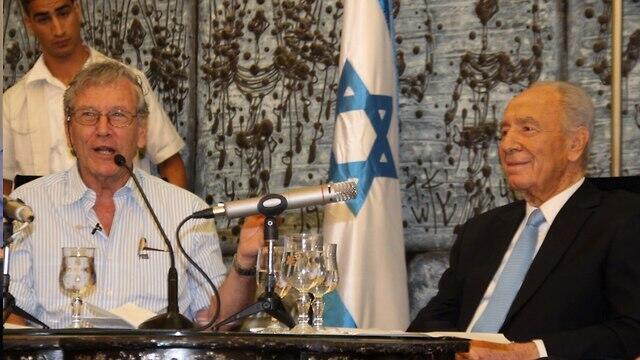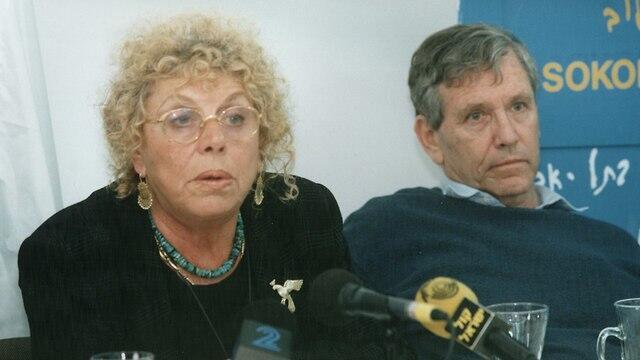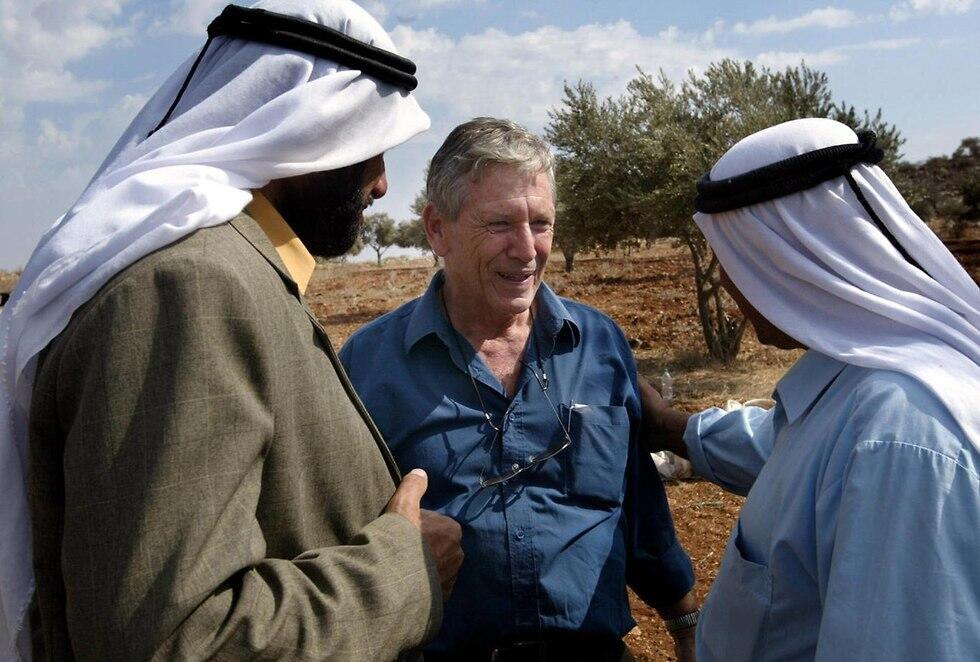Getting your Trinity Audio player ready...
It was almost a sacred custom that every Friday at 5pm, the phone rang at the home of the late Israeli statesman Shimon Peres, as his friend and author Amos Oz called for a conversation that ranged from politics to hope to sorrow to the profane. "Maybe they had one of their chats in heaven this afternoon," said Peres' son, Chemi, shortly after Oz's death.
Oz was no stranger in Peres' home. The latter would read drafts of Oz's books to offer his comments, and would often host him for lunch on Shabbat. Some of these meals were also joined by Chemi Peres, who defined them as observing two learned people in conversation. "There was a wellspring of wisdom, dreams and stories," he said. "Those were hours of joy and pride for those in attendance to be part of such a wise and wonderful nation, a special, unique country, a country born of a dream."
The friendship between the former president and the writer, who was considered one of the greatest Israeli writers of the 20th century, was not exceptional on the Israeli left. While Peres was stamping his feet in the Knesset in order to bring about a dialogue with the Palestinians, Oz was largely the voice of the camp that could write about the ideas that so many believed in, but did not know how to express. As his friends defined him: "In a world without rabbis, he was the lighthouse of the left."
Oz's views were never secret. He dreamed of a world in which we and our neighbors would live in peace, but nonetheless he never felt the need to apologize for being Israeli or that the values of the state were important to him. Many on the Israeli left saw him as their spokesman, but Oz was never been an official mouthpiece for the left-wing, anti-settlement movement "Peace Now," according to one of its founders, Tzali Reshef.
'He was our voice'
Oz's political activism stemmed from the early 1960s, as an activist in the social-democratic group "Min Hayesod" ("from the foundations"). From there, he went on to support the Moked party.
In 1978, with the release of a letter penned by IDF officers tothen-prime minister Menachem Begin, which later grew into the Peace Now movement, Oz asked to meet with some of the group's leaders. Tzali Reshef recalls: "We were about 15 years younger than him when he sought a meeting with us. He was also young, but already known for his literary achievements, and he was our voice, a voice to be identified with Peace Now.
In February 1988, during the first intifada, Oz, poet Yehuda Amichai and novelist A.B. Yehoshua co-wrote a letter in the New York Times ,urging American Jews to express their views on Israel's policy in the territories.
In his speech at a Peace Now rally a year later, Oz called the supporters of radical far-right Rabbi Meir Kahana a "messianic sect" and said he would not be complicit in the expulsion of Arabs. "We must stand up and say strongly and simply: This is an impossible idea because we will not allow you to expel the Arabs, even if we have to create a right between the army and the state."
Over the years, Oz was close to the Labor party, but left in the 1990s to join Meretz under the leadership of Shulamit Aloni. The two were friendly, and would regularly discuss peace initiatives.
In 1993, Oz welcomed the creation of the Oslo Accords, publicly supporting them and giving inspiration to his associates who backed the agreement. But before the 2001 elections, Oz and a group of peace activists published a statement in Haaretz that rejected the right of return for Palestinian refugees to Israel, on the grounds that such an event would lead to the destruction of the Jewish state. In the Knesset elections that took place two years later, Oz appeared in Meretz election broadcasts and called on voters to support the party.
"He was deeply rooted in this country, loved it very much, but also criticized it," says Amos Oz's close friend and former Meretz MK Haim Oron. "The people lost a writer and a man, I lost a friend," he says.
"Our friendship was both ideological and geographical," Oron says. "We had an ideological connection and a political connection, and I think that Amos was a person with exceptional wording and expression, he said and wrote what many of us thought, but he could precisely encapsulate our thoughts."
'When Rabin was murdered we cried like little children'
In October 2003, Oz was one of the authors of the Geneva Initiative. The architect of the initiative, Yossi Beilin, says that Oz was usually the most hawkish man in the room during the talks.
"He was very active in the negotiations, and very aggressive," says Beilin. "He assumed the role of teacher for the Palestinians, explaining to them the (Jewish) connection to Jerusalem. He had influence over the negotiations; there were a few things that we argued about with the Palestinians, and he was always on the more demanding side of those arguments."
Beilin, who met Oz in 1965, recalls Oz's reaction to the assassination of Labor Prime Minister Yitzhak Rabin at a Tel Aviv peace rally. On the night of the murder, November 4, 1995, the two sat at the Consulate General in New York.
"We were on the way to the hotel after dinner and we went up to the room. I told him that they had announced the murder, and we both cried there like little children, His death saddens me not only because he was the moral compass of our camp, but also personally because he was a true human being. "




